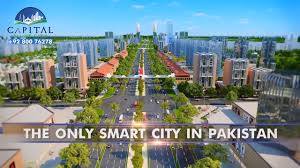
Addressing Urbanization Challenges
As Pakistan’s urban population continues to grow, the government has made significant investments in developing smart cities to address the challenges posed by rapid urbanization. With cities like Karachi, Lahore, and Islamabad facing increased traffic congestion, pollution, and strain on infrastructure, the concept of smart cities is seen as a transformative solution to improve urban living. The initiative focuses on integrating technology into urban planning to create more efficient, sustainable, and livable cities. By leveraging innovations in data analytics, IoT (Internet of Things), and renewable energy, Pakistan aims to create urban spaces that are not only technologically advanced but also environmentally friendly and socially inclusive.
Technological Integration for Sustainable Development
Smart city development in Pakistan involves the use of cutting-edge technologies to optimize resource management, energy usage, and waste disposal. Through the integration of sensors and data-driven systems, smart cities will enable real-time monitoring of public services, such as water distribution, traffic management, and waste collection. For example, intelligent traffic management systems will help reduce congestion by adjusting traffic signals in real time based on traffic flow, while smart grids will ensure the efficient use of electricity and reduce energy wastage. These innovations aim to improve the quality of life for residents while contributing to environmental sustainability by minimizing resource consumption and waste.
Enhancing Urban Mobility and Connectivity
One of the key features of Pakistan’s smart city initiative is enhancing urban mobility and connectivity. The development of smart cities will include the creation of advanced transportation networks, such as electric buses and driverless vehicles, along with better infrastructure for walking and cycling. The cities will also have integrated public transport systems, providing citizens with efficient and sustainable travel options. By using digital platforms and apps, residents will be able to access real-time information about traffic conditions, public transport schedules, and other essential services, making it easier for people to navigate cities and reducing dependence on private vehicles.
Public-Private Partnerships and Investment
To ensure the success of smart city projects, the Pakistani government is encouraging collaboration between the public and private sectors. International and local companies specializing in urban technology, construction, and energy solutions are being invited to invest in the development of smart cities. Public-private partnerships (PPPs) will play a crucial role in financing the construction of smart infrastructure, as well as in the implementation of technology-driven solutions. By leveraging private expertise and funding, Pakistan aims to accelerate the development of smart cities, making them more affordable and efficient for both citizens and businesses.
Long-Term Benefits and Global Recognition
The long-term benefits of smart city development in Pakistan are expected to be far-reaching. As these cities evolve, they will provide a higher standard of living for residents, with better access to healthcare, education, and public services. The incorporation of green technologies and energy-efficient systems will help reduce pollution and mitigate the effects of climate change, making the cities more resilient to environmental challenges. Moreover, as Pakistan leads the way in smart city development in South Asia, it has the potential to gain global recognition as a hub for innovation and sustainable urban growth, setting an example for other countries to follow. Ultimately, the smart city initiative will be a key driver of Pakistan’s socio-economic development and modernization.

